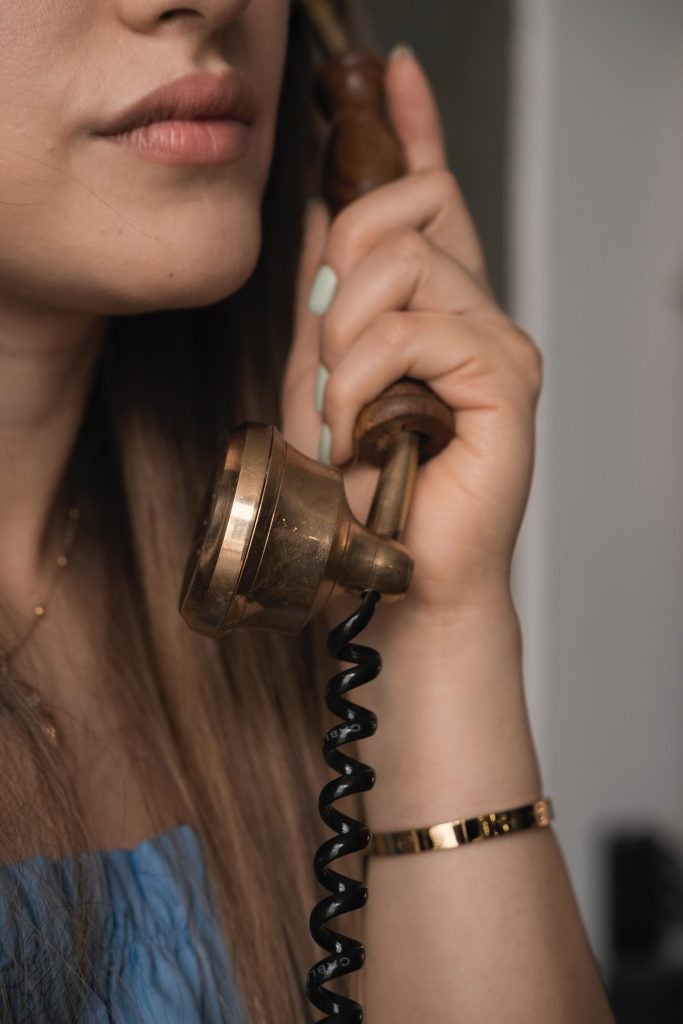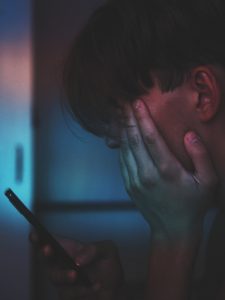Disclaimer: We acknowledge that there are many different words that individuals use to describe themselves after experiencing sexual assault. In this article, we only use the term “survivor” for the sake of consistency. We acknowledge that there are many ways of processing sexual violence, and we believe each individual should be able to choose the language that they are most comfortable with.

Telephone scatolophilia or scatologia is a paraphilia in which an individual makes obscene phone calls for their own sexual gratification. Paraphilia refers to sexual desires that involve extreme, dangerous, or harmful activities. Individuals with this paraphilia are called scatophiliacs or scatolophiles. They will typically make sexual suggestions or comments to an unsuspecting individual over the phone. The individual’s reaction of shock and discomfort is then satisfying to a scatolophiliac. This reaction is a “turn-on” that may cause the scatolophiliac to masturbate during the interaction, or at memories of a previous interaction. Since their goal is to keep the person on the phone to derive satisfaction, they may employ persuasive manipulative tactics or threats. However, this behavior has decreased in recent years due to increasing developments in technology, such as the ability to see caller ID.
Although research on scatolophilia is limited, it is often linked with voyeurism and exhibitionism. These are all forms of sexual assault that intend to shock others and cause distress. Voyeurism is a paraphilia in which a person derives sexual pleasure from the act or idea of watching unsuspecting people while they are undressing, bathing, participating in sexual acts, or engaging in other private activities. Exhibitionism is a paraphilia in which a person derives sexual arousal from the act or fantasy of exposing their genitals to nonconsenting strangers. While voyeurism and exhibitionism can manifest as paraphilias, they are also fairly common consensual practices within the realm of atypical sexuality and bondage, dominance, sadism and masochism (BDSM). However, in the case of paraphilias, they are often grouped together with scatolophilia.
Common Characteristics of Scatolophiles
Research into scatolophiles suggests that offenders are typically heterosexual males with no significant cognitive deficits. They have an average or elevated sex drive, but they tend to have limited social interaction. Offenders may have experienced failed relationships in their past; therefore, garnering feelings of anger towards women. 1
There is research that also supports the possibility that offenders are more likely to have criminal histories.
Studies suggest that there are three main types of offenders: the first being profane and immediately suggestive. The second draws the listener in and establishes contact, then leads the conversation into offensive suggestions or comments, and the third kind tricks the listener into revealing personal information. 2
Survivors of Scatolophilia

Although phone calls are considered non-contact offenses, they still have a profound impact on a person’s emotional wellbeing. Survivors reported long-lasting negative emotional effects on their lives, such as difficulty with sleep, and anxiety about being home alone or leaving their homes. Scatolophiles are likely to target certain individuals over others. The two most common targets are adult women and children. 3 While these are the most common survivors, any individual could be targeted with obscene phone calls.
Adult Women
The level of harm reported by adult women is dependent on situational factors at the time of the call. Survivors who were in the presence of others reported feeling the safest. However, survivors who were alone at home alone at night when the incident occurred reported more severe levels of fear. 4
Children
Child survivors of scatolophiles are more likely to obey the demands of the caller. A longitudinal study researched children’s feelings immediately after obscene phone calls and then again months or years after this interaction. In the minutes and hours following the calls children reported feelings of fearfulness, worry and embarrassment. Many were shocked and wanted to cry or isolate themselves. When interviewed again months or years after their incident, many of the children were still suffering symptoms from the calls. 5 The children who obeyed the caller’s requests seemed to suffer more psychological damage than the children who hung up the phone. The lasting psychological impacts found in children were about as severe as children who experienced contact sexual abuse.
Therapy for Scatolophiles
Research into scatolophiles is limited. This is because many offenders do not self-report, and many survivors hesitate to report their experiences. There are generally few people prosecuted for the crime of telephone scatalogia; therefore, there are few offenders to interview and assess. Individuals who experience scatolophilia may benefit from individual and group therapy. This may include sexual therapy for atypical turn-ons and dialectical behavioral therapy.6 Individuals concerned about committing child sexual abuse may want to contact the helpline 1.888.PREVENT, its email and chat response service provides information, referrals and support for individuals concerned about possible child sexual abuse.
Protecting Yourself
A survivor of obscene phone calls may be unsure of how to act in the situation. The following is a list of tips for protection against scatolophilia:

- Refrain from answering unknown phone numbers
- Block unwanted numbers
- Hang up the phone if you realize the caller is making obscene remarks
- Never give out personal information over the phone
- Do not exhibit an emotional reaction to obscene suggestions
- Do not delete obscene phone messages, they can be used as evidence
- Report the call to local authorities
- Change your phone number if calls or messages keep persisting
These are just a few of the ways to keep oneself safe. There are additional resources that provide support to sexual assault survivors, such as the anti-sexual violence organization https://www.rainn.org, who also have a 24-hour confidential hotline at 800.656.HOPE(4673).
Concluding Remarks
Although telephone scatolophilia has been on a steady decline in recent years, it continues to happen around the world. However, with developments in recent technology it is easier to track caller ID and prosecute offenders. Knowing tips and advice in protecting yourself from obscene phone calls has the power to greatly reduce the prevalence of scatolophilia. If you or someone you know have been affected by scatolophilia, it is imperative to remember there are ways to report the incident and reach out for help through therapy or national anti-sexual violence hotline.
References
1 Zinberg , A. M. (2015). Telephone Scatologia: A review of the limited literature . University of Ontario Institute of Technology .
2 Zinberg , A. M. (2015). Telephone Scatologia: A review of the limited literature . University of Ontario Institute of Technology .
3 Newring, K.B. (2014). Telephone scatalogia. In W. O’Donohue (Ed.), Case studies in sexual deviance: Towards evidence based practice (p.168-194). New York: Routledge
4 Zinberg , A. M. (2015). Telephone Scatologia: A review of the limited literature . University of Ontario Institute of Technology .
5 Leander, L., Granhag, P. A., & Christianson, S. A. (2005). Children exposed to obscene phone calls: What they remember and tell. Child Abuse & Neglect,29, 871–888. doi: 10.1016/j.chiabu.2004.12.012
6 Milner, J. S., Dopke, C. A., & Crouch, J. L. (2008). Paraphilias not otherwise specified: Psychopathology and theory. In D. Laws & W. O’Donohue (Eds.),Sexual Deviance: Theory, Assessment, and Treatment(2nd ed., pp. 384-418).
Last Updated: 30 November 2021
